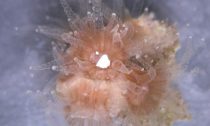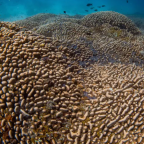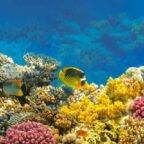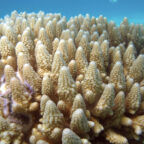
Plastics are abundant in our oceans. Now scientists have found that corals — which already faces numerous threats and have declined on a staggering scale — may be feeding on it not because it resembles prey, but because it actually tastes good to them.
Corals are living organisms. Coral reefs are collections of thousands or even hundreds of thousands of tiny creatures called polyps which attach themselves to a rock or the skeletons of dead corals. The beautiful colours you may be familiar with are caused by microscopic algae that live inside their tissue.
And while we may appreciate their beauty, corals are an important feature in our oceans, providing food and shelter for millions of marine creatures.
But there’s also something else in abundance in our waters: plastic. A 2015 study suggested an average of roughly eight million tons of it made its way into our oceans in 2010 alone.
- Scientists race to save world’s coral reefs.
- Coral bleaching occurs in Great Barrier Reef for 2nd year.
- To save coral reefs, stop global warming, scientists say.
And researchers have found that plastic is quite appealing to corals.
In a new study published in the Marine Pollution Bulletin, researchers conducted two experiments.
In the first, they hand-fed the corals microbe-free, pre-production plastic as well as organic-free sand.
In the second, they put corals into a feeding chamber and either exposed them to clean plastic or plastic covered in biofilm (film containing organics). They then moved the corals to another container where they could see if the corals spat it out.
What they found surprised them in many ways.
First, contrary to what some scientists believed, corals weren’t eating plastic because it looked like prey, but instead because it “tastes good” to them.
“They’re not indiscriminate feeders. They discriminate prey using chemical sensors analogous to taste receptors,” Alex Seymour, lead author of the study, told CBC News.
“Corals discriminate between particles of plastic and sand, and they greatly prefer the plastic when given these two things,” Seymour said.
The second reason was much more of a surprise: they preferred microbial-free plastic over that which was covered with a biofilm.
“Our hypothesis was that … the corals would widely prefer the microbial-filmed plastic, because we assumed that adding a bacterial film would add some … tasty compounds,” Seymour said.
“We thought the microbial-film would add nutrients and potentially an attractive taste. Our results suggested the exact opposite.”
In fact, the corals preferred the biofilm-free plastic five times as much as those that contained it.
Potential consequences
The plastic, they believe, contains some sort of chemical that makes it particularly tasty to the corals; the biofilm covers up the taste.
Of course, corals can’t digest the plastic. That’s why the experiment involved putting them in a container to see them expel the unnatural substance.
The corals spit up about 90 to 92 per cent of the plastic within six hours. The researchers waited 24 hours to see if more would pop back up. It didn’t. That means that roughly 10 per cent of plastic remained in the gut. And that could be dangerous.
The health of corals has garnered international attention in recent years after an incredibly strong El Niño raised ocean temperatures around the globe in 2016. Corals are extremely sensitive to temperature changes and can begin to die with just a 1C rise.
In one area of Australia, it was estimated that roughly 70 per cent of shallow water corals died as a result of severe bleaching, which occurs when corals eject the algae that provide them with food. Though they can survive, if the algae never return, they starve and die.
A 2015 study which first confirmed that corals were ingesting microplastic, which in turn precipitated this study, found “that ingestion of high concentrations of microplastic debris could potentially impair the health of corals.”
It’s another threat corals are going to have to overcome if they hope to survive.
Following the study, Mia Hoogenboom, a chief investigator with the ARC Centre of Excellence for Coral Reef Studies at James Cook University in Australia expressed concern over coral health.
“Marine plastic pollution is a global problem, and microplastics can have negative effects on the health of marine organisms,” Hoogenboom said in a statement.
Though the effects plastic consumption have on corals wasn’t studied in this new research, Seymour said there is the possibility that any leftover plastic could be giving the corals a feeling of fullness which could result in lack of food.
It could also create blockages, which has been found to occur in other animals that have consumed plastic.
“I’m definitely not suggesting that microplastics are an equal threat to corals as climate change and bleaching,” Seymour said. “It’s just another drop in the bucket of the multitude of known threats that face corals already.”















Social Profiles